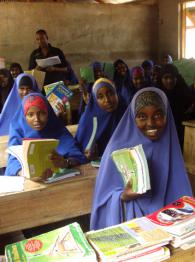
About the Project
This project is one of the 2010 WISE Awards finalists.
UNHCR counts 10.4 million refugees of concern as of 2013. Most young refugees are eager to learn when opportunities exist but very few with the chance to complete high school can pursue higher education. WUSC’s Student Refugee Program (SRP) has been enabling young refugees from camps in Kenya (Dadaab and Kakuma), Malawi, the Middle East and Thailand to study and resettle in Canada. The refugees from these asylum countries come from the Horn of Africa, Africa’s Lake Region, Iraq and Myanmar. The SRP is the only program in the world that combines education with the resettlement of young refugees, with the direct involvement of Canadian post-secondary students. WUSC works with partners overseas to prepare candidates prior to their arrival in Canada. The Canadian sponsoring groups provide vital social, educational and peer support and generate 87 percent of SRP funding with the support of donations from universities, colleges, foundations, governments and individuals. Every year, 80 students are sponsored and supported by their youth-led sponsoring groups in Canadian colleges and universities. Since 1978, over 1,350 SRP students have enrolled in the program. The majority have become engaged Canadian citizens and some have gone back to their country of origin to help in nation rebuilding. The SRP provides hope and direction in the camps and promotes education.
Context and Issue
The project addresses the issue of lack of opportunity for refugees in order for them to continue their education at post-secondary level. Young refugees are among the most vulnerable populations in the world. Because of their refugee status and their confinement in camps, their tremendous potential is thwarted without access to education. They are neither able to achieve their dreams, like other “free” young people in their age group, nor can they obtain employment in the camps without education and training. They risk remaining part of an untrained workforce that lacks knowledge and skills to participate in building their country of origin. The opportunities, fulfillment and abilities gained through education mean that education is a sure way of increasing global stability and greater peace and prosperity in the world.
The Solution and Impact
The underlying model is based on youth-to-youth, peer-to-peer sponsorship and the support between Canadian post-secondary students and refugee students who are welcomed to Canadian campuses.
In terms of impact, an in refugee camps where the Student Refugee Program exists, the program raises the value of education at all levels and provides hope and direction for students, reduced secondary-school dropout rates, increased girls’ attendance and a significant positive effect on refugee lives. Canadian campuses benefit from an intercultural experience through involvement with SRP. Campuses and communities with WUSC volunteer committees tap into the power and spirit of volunteerism which enriches, enlightens and mobilizes.
Canada is strengthened by the immigration of hardworking, talented, educated new citizens. The countries of origin of sponsored refugee students often benefit from nation-building efforts by SRP graduates.
Future Developments
In the coming five years, it is hoped to continue operating the program at the fullest capacity allowed by resources. If resources increase, the Student Refugee Program could consider scaling up the program. It is intent on increasing the number of female sponsored students and would like to add to the diversity and number of countries where it can select and prepare candidates for the Student Refugee Program. This would require finding effective partners and adequate funding.
In addition, the Program continues providing remedial classes in Dadaab and Kakuma (Kenya Equity in Education Program), as well as in Malawi, for girls through the 60 Million Girls Foundation to improve their access to education and to increase their number attending secondary education in order to eventually increase girls’ education and participation in the SRP. Funding for remedial classes was also provided by the US State Department’s Bureau for Population, Refugees and Migration and UK aid through their Girls’ Education Challenge.
In the next few years, the Student Refugee Program will be exploring paths for further and potentially increased funding, looking for new means and partners to address educational needs in protracted refugee situations.


